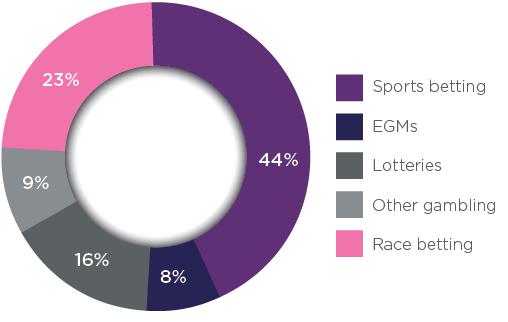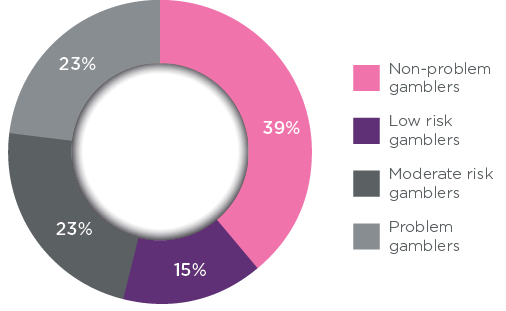Sports betting in Australia
December 2017
Andrew Armstrong, Megan Carroll
Download Research snapshot
Overview
This Research Summary details findings on sports betting activity in Australia. Our findings were derived from analysis of the 2015 Household, Income and Labour Dynamics in Australia (HILDA) Survey.1 The HILDA Survey is designed so that findings can be generalised to the Australian adult population.
Survey-based estimates show that in 2015, well over half a million Australian adults regularly placed bets on sports. Most sports bettors were men, and aged between 18 and 49. Their typical monthly expenditure on sports betting amounted to around $1,000 each over the year. Forty-one per cent of regular sports bettors experienced one or more gambling-related problems.
Key messages
-
In 2015, well over half a million Australian adults (574,000) were estimated to have regularly wagered on sports.
-
Sports bettors were overwhelmingly male (88%), aged between 18 and 49 (75%), and working full-time (70%).
-
On average, sports bettors spent close to half their typical gambling outlay on sports betting (45%), and just over half on other activities.
-
Forty-one per cent of all regular sports bettors—234,000 adults—experienced one or more gambling problems in 2015.
-
In a typical month, 46 cents in every dollar spent on sports betting by regular sports bettors came from a person with moderate to severe gambling problems.
Sports betting participation
Well over half a million Australian adults (574,000) placed bets on sports (excluding horse and dog racing2) in a typical month of 2015.3 They represented 3.3% of Australian adults, or 8% of those who gambled in a typical month (i.e., regular gamblers). This made it the fifth most popular regular gambling activity, after lotteries, scratch tickets, electronic gaming machines (EGMs, aka "pokies"), and race betting.
Nationally, typical monthly sports betting expenditure amounted to roughly $579 million over the year.4 This equates to an estimated spend of $1,032 a year per sports bettor.
Sports bettors also spent money on other gambling activities, with sports betting making up 45% of their total gambling spending. Their remaining gambling outlay was mostly spent on race betting and lotteries (Figure 1). In total, the average sports bettor spent $192 across all gambling activities in a typical month of 2015, amounting to $2,305 over the year.5
Figure 1: Average proportion of sports bettors' gambling expenditure spent on each activity

2 For race betting statistics, see Armstrong & Carroll, 2017b.
3 Recent estimates suggest that between one and two million Australians place sports bets at least once in a given year (Armstrong, Thomas, & Abbott, 2017).
4 The proportion spent on Australian or offshore sites was not reported by HILDA participants. This, the emphasis on "typical" rather than total monthly expenditure, and the omission of expenditure by infrequent gamblers in the HILDA Survey, limits the comparability of these expenditure figures to those reported by the Australian sports betting industry for the same period (which was $814m; Queensland Government Statistician's Office, 2016).
5 The HILDA Survey captured information about expenditure in a typical month and annual expenditure has been estimated from that by multiplying by 12.
Demographics
Regular sports bettors were overwhelmingly male (88%), aged between 18 and 49 (75%), and worked full-time (70%). They were much more likely to have a higher-than-average income (55%) than lower-than-average income (28%).
Furthermore, compared to the Australian adult population, a substantially higher proportion of regular sports bettors were single (56% of sports bettors vs 45% of Australian adults), born in Australia (82% vs 70%) and identified as Indigenous (4.6% vs 2.3%).
Gambling problems
In 2015, 41% of all regular sports bettors - 234,000 adults - experienced one or more gambling-related problems (Table 1). That is, their gambling behaviour caused or put them at risk of harm.6 This was more than double the rate among regular gamblers nationally. This further means that one fifth of all regular gamblers who experienced problems in Australia regularly participated in sports betting.
Around 23% of regular sports bettors - 134,000 adults - had moderate to severe gambling problems.
| Gambling problem severity | Regular gamblers | Regular sports bettors |
|---|---|---|
| No problems | 83.3% | 59.3% |
| Low-level problems | 8.7% | 17.3% |
| Moderate problems | 5.9% | 17.1% |
| Severe problems ("problem gamblers") | 2.1% | 6.3% |
| Any problems | 16.7% | 40.7% |
Sports bettors who experienced gambling-related problems spent much more on gambling than those who did not experience problems. Those with severe problems, known as problem gamblers, spent close to six times as much on sports betting over the year ($3,910 vs $693) and close to seven times as much on gambling overall ($9,717 vs $1,428) (Figure 2). This was higher than the amount spent by problem gamblers on any other activity.
Figure 2: Average expenditure by regular sports bettors in 2015. 
In a typical month, well over half of all sports betting expenditure by regular gamblers - 61 cents in every dollar - was accounted for by those who experienced any sort of gambling problem (Figure 3). Close to half - 46 cents in every dollar - was accounted for by those who experienced moderate to severe problems.
Figure 3: Proportion of sports betting expenditure by regular gamblers accounted for by those with gambling problems

Regular sports bettors who reported problems had four characteristics that distinguished them from those who did not experience problems. They were more likely to be:7

6 HILDA Survey participants reported gambling-related problems on the Problem Gambling Severity Index (PGSI; Ferris & Wynne, 2001). The PGSI consists of nine items that capture problematic behaviour and harm caused by gambling in the past 12 months. The higher the score, the greater the gambling-related problems. Non-problem gamblers report no problematic gambling behaviour or harm. Low-risk and moderate-risk gamblers report low or moderate level problematic behaviour and/or consequences. They are considered as being at low to moderate risk of becoming problem gamblers. Problem gamblers report severe problematic behaviour and/or consequences.
7 For detailed statistics, see Armstrong & Carroll, 2017a.
Types of problems
The types of gambling-related problems experienced by regular sports bettors were also explored. In 2015, almost one in five sports bettors (18%; 103,000) felt they might have a gambling problem. Close to a quarter bet more than they could afford to lose (22%; 126,000); 27% (16,000) tried to win back money they lost on another day. For 12% (70,000), gambling had caused them physical or mental health problems. These problems stemmed from bettors' overall gambling activity, which included sports betting.
Sports bettors who experienced gambling-related problems were also much more likely than those who did not, to live in households that experienced financial problems. The likelihood of financial problems escalated with the severity of sports bettors' gambling problems. Half of all households containing a sports bettor with severe gambling problems had members who reported asking family or friends for financial help during the year. A third (34%) had household members who reported they could not pay bills on time due to a shortage of money, and a quarter (28%) could not pay the rent or mortgage on time. These and other financial problems were substantially less prevalent in households where sports bettors reported no gambling problems.
Conclusion
Our analysis of the 2015 HILDA survey data shows that more than half a million Australian adults gambled regularly on sports. These people were twice as likely to experience gambling-related problems as the average Australian regular gambler. It shows that those who experienced greater problems spent substantially more than those without problems, and that they were more likely to live in households that experienced financial problems.
References & further reading
- Armstrong, A., & Carroll, M. (2017a). Gambling activity in Australia. Melbourne: Australian Gambling Research Centre, Australian Institute of Family Studies.
- Armstrong, A., & Carroll, M. (2017b). Race betting in Australia. Melbourne: Australian Gambling Research Centre, Australian Institute of Family Studies.
- Armstrong, A., Thomas, A., & Abbott, M. (2017). Gambling participation, expenditure and risk of harm in Australia, 1997-98 and 2010-11. Journal of Gambling Studies, 0, 1-20. Doi: 10.1007/s10899-017-9708-0
- Ferris, J., & Wynne, H. (2001). The Canadian Problem Gambling Index: Final report. Ottowa: Canadian Centre on Substance Abuse.
- Queensland Government Statistician's Office. (2016). Australian gambling statistics (32nd ed.). Queensland, Australia: Queensland Treasury..
Featured image: istockphoto/LeoPatrizi
Armstrong, A. R., & Carroll, M. (2017). Sports betting in Australia. Melbourne: Australian Gambling Research Centre, Australian Institute of Family Studies.